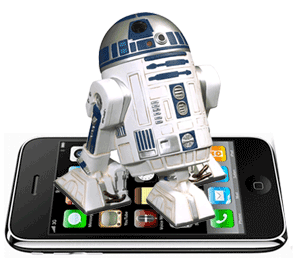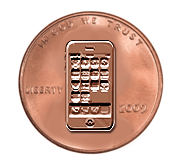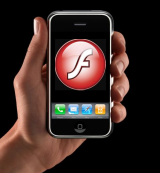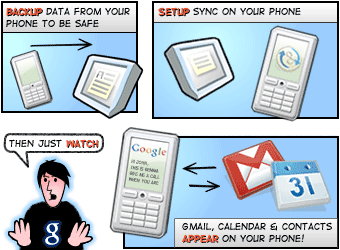 Verizon Wireless, which recently announced it was hopping on the Android smartphone OS bandwagon big time, has started whetting our appetite for its first Android phone. It’s launched a TV ad for the phone, the Droid, and a teaser site. And so far, it’s mostly promoting the phone by bashing the iPhone, with pseudo-Apple text pointing out that “iDont” have a physical keyboard, (third-party) multitasking, a five-megapixel camera, much in the way of customization options, widgets, “open development,” the ability to take photos in the dark, or a removable battery. The Droid (whose name is licensed from Mr. Lucas) presumably has all of the above.
Verizon Wireless, which recently announced it was hopping on the Android smartphone OS bandwagon big time, has started whetting our appetite for its first Android phone. It’s launched a TV ad for the phone, the Droid, and a teaser site. And so far, it’s mostly promoting the phone by bashing the iPhone, with pseudo-Apple text pointing out that “iDont” have a physical keyboard, (third-party) multitasking, a five-megapixel camera, much in the way of customization options, widgets, “open development,” the ability to take photos in the dark, or a removable battery. The Droid (whose name is licensed from Mr. Lucas) presumably has all of the above.
It’s an entertainingly combative ad, and a pretty effective one given that it doesn’t even show the phone (which apparently looks like this). Of course, the fact that the Droid beats the iPhone on a number of spec- and feature-related fronts doesn’t make it a breakthrough. It’s quite common for smartphones to theoretically trump the iPhone in multiple ways, but the iPhone’s level of hardware/software/service integration and the vast quantity of available apps remain unique. No other phone is going to catch up with the iPhone’s software catalog anytime soon, so if I were an Apple competitor, I’d concentrate on trying to vaunt into the same league in terms of integration. Not that that’ll be easy. The Droid arrives next month, so we won’t have to wait long to judge it.
The other interesting question about the Droid commercial is this: Does all its cheeky iPhone-bashing signal that Verizon has no plans to sell the iPhone anytime soon? It not only mocks the phone but mocks Apple in a way that suggests that it doesn’t plan to go into business with it, despite rumors. I took the implied message of the ad as being something like this: “Yes, we know that a lot of people want a Verizon iPhone, but hold on–we’re going to have a smartphone that’s better than an iPhone.”
(Then again, I’m fascinated by this Verizon ad that says a non-Verizon BlackBerry is a paperweight–it might be an effective ad, but it seems like an odd thing to do to BlackBerry maker and Verizon partner RIM.)
Anyhow, here’s the “iDon’t” ad:

 Gizmodo’s John Herrman has a
Gizmodo’s John Herrman has a 
 The iPhone may be the only major smartphone in the known universe that’s
The iPhone may be the only major smartphone in the known universe that’s 


